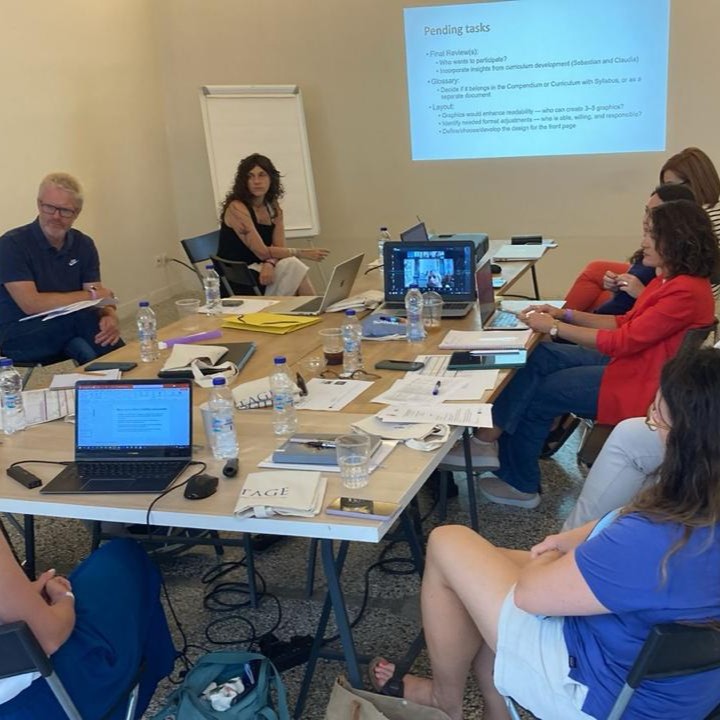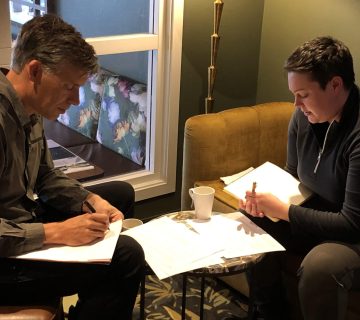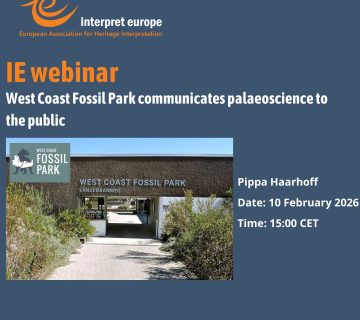Empaths turns its focus on the structure and content for a pilot training programme on participatory HI for heritage professionals.
The Empaths project partners from Germany, Austria/Slovenia, Italy and Greece met in Athens on 18-19 September for the second in-person transnational project meeting, hosted by HERITΛGE. Almost one year into the project, the goal of a pilot training programme to initiate heritage professionals in the principles and practice of participatory heritage interpretation (HI) is on the horizon.
Of course, participatory heritage interpretation is not new to many interpreters. Indeed, IE has been refining its approach through value-based HI over much of the last ten years but professionals in the wider heritage sector are still largely unfamiliar with it and/or suffer from a lack of capacity and resources to practice it. Empaths allows IE to further enrich its approach to participatory HI by collaborating with partners in a wide range of social, cultural and geographical settings to test a training programme involving both heritage professionals and local communities interpreting their heritage together.
The project began by gathering experiences, advice and visions of participatory practice worldwide from expert heritage interpreters and from non-heritage professionals such as, for example, community development and civic mediation specialists. Now, the challenge is to devise an inventive and inspiring combination of methods and tools that will form a pilot online and on-site training programme in principles and practice of participatory HI. Geared to local and national heritage professionals, the online training will draw on HERITΛGE’s extensive experience in virtual learning to prepare the trainees for on-site ‘community labs’ where they will work with local people to interpret together specially selected sites or places that have a significance to the local communities in Thrace, the cross-border Karavanken/Karavanke Geopark and the Campi Flegrei archaeological park in the Bay of Naples.
European projects are teeming with free training courses, so how can we make the Empaths offer attractive and worthwhile to busy heritage professionals with precious little time? That challenge was ably taken up by IE colleagues, Claudia Grünberg and Sebastian Zoepp, both skilled practitioners in value-based heritage interpretation and community building. Drawing on their experience, research conducted by Empaths and guidance from some leading personalities in the field, Claudia Grünberg presented a methodological framework and an outline for the future training curriculum and syllabus to be tested in the three pilot territories mentioned above.
The training programme is built on six basic tenets related to the 2005 Faro Convention:
- Everyone has the right and capacity to interpret
- Participatory HI fosters democratic and inclusive societies
- Community participation is central to inclusive and emancipatory HI
- Participatory Hi is done with communities, not for them
- Interpreters become facilitators when practicing participatory HI
- Ethical principles must guide all participatory HI processes
The online training will comprise a short series of recorded materials supplemented by live exercises and exchange. Subjects covered include the fundamentals of participatory HI, community mapping, co-creating narratives, organisation and facilitation skills, participatory planning and sustaining engagement. The on-site ‘community labs’ will turn the principles learned online into practice at a carefully chosen site with significance for the local community. Here, the heritage professionals will work with local community participants to jointly interpret the qualities of the site and formulate themes and narratives, ideally for a concrete project such as a discovery trail or even an interpretive plan or strategy. To that end, it is vital that the on-site training has a tangible benefit for the local community, especially when it comes to sustaining initiatives after the pilot training ends.
The methodological framework for the Empaths training programme is being finalised and will be uploaded to the Empaths website soon while the partners will continue their work to assemble and assess the training materials from now until the New Year. The pilot training courses will begin with the online module for heritage professionals in late spring 2026 while the on-site ‘community labs’ are scheduled for after the summer holiday period, again in 2026.
For further details on the Empaths project and to view the results so far, go to https://empaths-project.eu and click on the links to follow the latest news on social media.
Alexander (Sandy) Colvine is IE’s Project Manager for Empaths. He can be contacted at: alexander.colvine@interpret-europe.net.
To cite this article: Colvine, Alexander (2025) ‘Empaths training programme takes shape’ in Interpret Europe Newsletter 3-2025, pp. 6–7.
Available online: Newsletter autumn 2025




